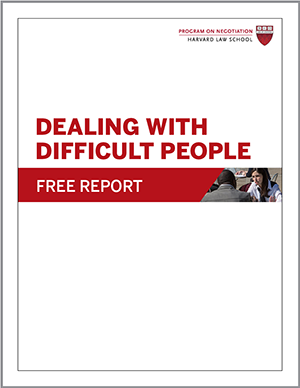
To what degree should you level the playing field for your counterpart in negotiations (see also, Negotiation Examples in Business: Putting Your Negotiated Agreement Into Action)? Let’s turn to the question of whether you have an ethical obligation to educate an uninformed buyer in your negotiation plans.
Question: My husband and I would like to sell our condo and buy a house right away, but we need to save a bit more money, as we are slightly under water on our current mortgage and want to preserve our nest egg. Recently, however, an acquaintance of ours told us that he loves our condo and wants to buy it. “Bill” seems to be rather uninformed about the housing market and isn’t looking at other places. He is working on getting prequalified for a loan, though we haven’t talked price yet. We are thinking about asking him to pay somewhat more than we would expect to receive on the open market—just enough to allow us to sell the condo without having to write a check. Our sense is that Bill would accept our price without haggling. We feel a bit guilty about our plan, though. Does it sound unethical?
Ethics at the Bargaining Table and Integrative Negotiation Strategies: Immanuel Kant and the Golden Rule?
Answer: Good for you for considering the ethical nuances of this situation. Very often, when dealing in ethical “gray areas,” negotiators make rationalizations that allow them to avoid measuring their choices against their moral standards.
It sounds as if you think you would be taking advantage of Bill if he agreed to pay a higher-than-market, somewhat arbitrary price for your condo. Your guilt may be triggered by the fact that you know Bill and probably like him. You might feel fewer qualms if, say, you put your condo on the market at the same high price, and it was snapped up by a stranger. Negotiators tend to be more concerned about the outcomes of people they know than of those they don’t know. If a stranger overpays, you might assume she has cash to burn. But presumably you are aware that this doesn’t apply to Bill.
Now about the ethics of the situation: Following the guidance of Immanuel Kant, some ethicists would say that you have a duty to treat Bill as you would want to be treated yourself. If you found out later that you had significantly overpaid for a commodity, you might be angry with the seller and feel cheated, even if you knew you hadn’t done your homework.
But other experts would argue that you aren’t morally obligated to educate a naive buyer, as long as you don’t lie outright or conceal crucial information. According to this more pragmatic view, bold claims and bluffs are par for the course in negotiation. If Bill doesn’t seek out readily available information or is shy about haggling with friends, that’s not your problem.
Reciprocity in Bargaining Scenarios
There’s no clear right or wrong here, but since you and your husband feel guilty, it sounds as if you subscribe more to Kant’s view.
If so, you may be able to protect your nest egg and your sense of integrity through creative negotiation. You could begin by quoting Bill your desired price and then explain why it’s currently your bottom line and suggest that he shop around. You might offer him a small “discount” if he agrees to negotiate without a real estate agent (thus avoiding the agent fees you would incur as the seller).
If Bill does some research and comes back ready to haggle, you might offer to go down a bit in price, sell the condo to him now, and rent it back from him until you’ve saved what you need for a house. Or you might stand firm on price but find other ways to meet Bill’s interests, such as doing minor upgrades to the condo with his input, helping him move, or introducing him to neighbors or local businesspeople who might assist him in some way.
A final note: Bill may receive a smaller mortgage than he would like if his lender determines through an appraisal that your home is overpriced. This could prompt Bill to drive a harder bargain than you are expecting.
Related Article(s): How Principal Agent Theory Works in Business Negotiations: Dealmaking Strategies for Bargaining with Agents
Long-Term Business Partnerships and Negotiated Agreements
First published as “Dear Negotiation Coach: “Does our negotiating plan sound unethical?”,” in the April 2013 issue of Negotiation Briefings.





Am surprised you are not unequivocal on this. There is an ethical obligation to disclose. imagine that the Bank becomes the one to disclose that the friend was being overcharged, how would he feel?